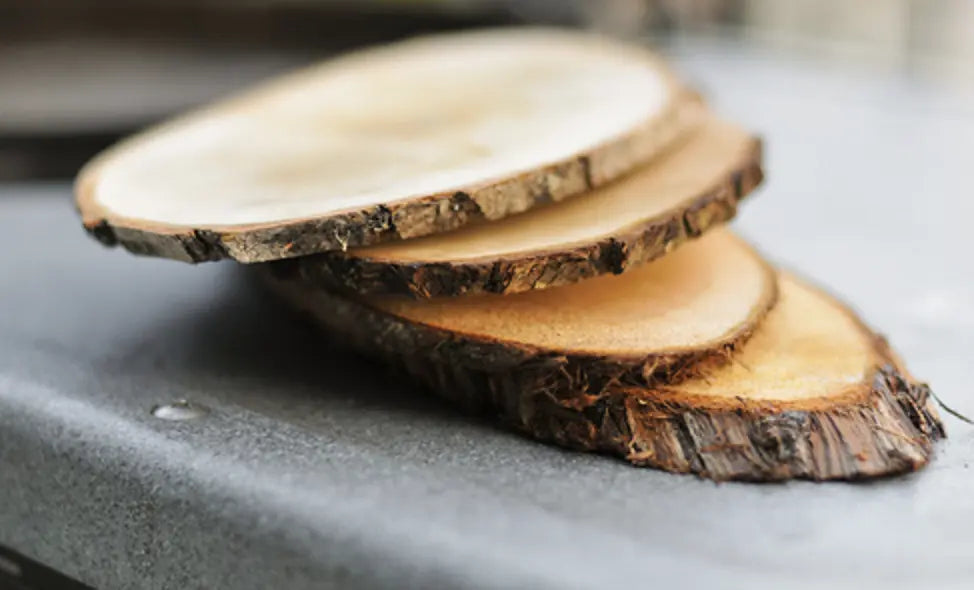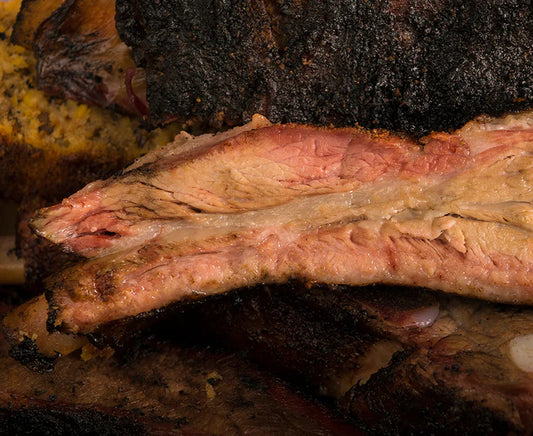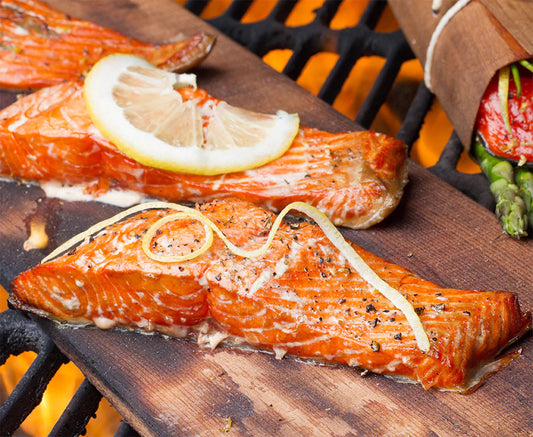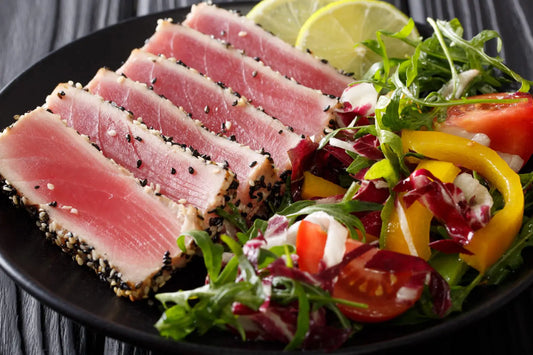The food smoking battle between charcoal and wood is something that professional smokers have always debated. Which is better and why? We break down the differences and similarities between wood and charcoal.
What is the Difference between Charcoal and Wood?
Charcoal and wood are two essential elements that we can use to smoke food. They both burn to create heat and smoke which imparts flavor and is used to smoke our meats and fish. While the process of smoking with these two fuels can be very similar, the outcomes can be very different.
Charcoal and wood often impart different flavors into your smoked meats. Charcoal and wood actually both originate from trees. It’s pretty obvious that wood comes from trees, however, charcoal is actually wood that has been already burned down to the point where it is just carbon.
The flavor imparted by charcoal and wood comes down to the makeup of each fuel source. When burned, both of these fuel sources release gases that mix with the air and water vapor. This combination of gas and heat creates the unique flavor that you can get from different types of wood or charcoal.
Different Types of Charcoal
There are two different types of charcoal which are commonly used in the smoking process. Charcoal briquettes are often found in your local supermarket or hardware store. These are manufactured for the consistent output of smoke and heat. They are compressed wood and sawdust mixed with some chemicals to help it maintain heat and shape. Seasoned smoker pros are unlikely to use a product like this. However, new smokers may consider briquettes, as it can make the smoking process easier.

The other main type of charcoal is lump charcoal. Lump charcoal is a very unique smoking fuel that is considered pure and clean-burning. This kind of charcoal is actually wood that has been burned without oxygen present, thus removing all moisture and other impurities from the wood, resulting in a heating element for your smoking. Lump charcoal tends to burn faster so you need to watch it closely and you may need to add more while smoking.
Different Types of Wood
Smoking Bisquettes, Wood Chips, Wood Pellets, and traditional hardwoods exist in the marketplace. The options are endless and dependent on the type of smoker that you have. For the most part, all these options will get the job done, however, it is important to keep in mind that some woods pair better with different types of meat.
Pro tip: Definitely check out which flavors of wood pair well with which types of food for the ultimate, tasty cookouts!
Almost all types of wood used for smoking are hardwoods. Hardwoods are from deciduous trees that produce fruit and nuts, like apple, cherry, mesquite, and oak. Hardwoods used for smoking and cooking are almost always wood that has been air-dried to remove much of the water.
Some woods burn faster and some burn more slowly. Some are “set it and forget it” and the job gets done. Thankfully you can turn to Bradley Smoker for your smoking Bisquettes which burn evenly and smoothly using the CleanSmoke Technology for even smoking at the specified temperature for your recipe.
Hardwoods come in all shapes and forms, ranging from chunks of hardwood to pellets and all the way down to sawdust. What shape of wood you are using depends on what you are cooking and how quickly you want to smoke. The smaller the piece of wood, usually means less cooking time. However, larger pieces of wood give off heat less evenly.

Different flavors of of Wood
Now, of course, there are many different flavors of wood that you can use in your smoker. Each type of wood imparts a different flavor. Some woods pair better with certain types of meat than others. Bradley Smoker offers a great selection of these wood flavors with its wide variety of smoking bisquettes. Below is an overview of different wood types and meat pairings to consider for your Bradley Smoker.
Cherry
Cherry Wood is a versatile wood. It pairs nicely with almost any meat that you are smoking. It also pairs very nicely with other woods such as oak if you want to add a little extra kick to your pork butt.
Cherry produces a light smoke that is good for long cooks to produce a nice subtle flavor. Don’t be surprised if the cherry wood smoke turns the meat you are smoking a little pink in color.
Pecan
Pecan wood is ideal for smoking poultry as it imparts a nutty and sweet flavor. It will also pair nicely with pork and game meats. Check out some Pecan Smoking Recipes from Bradley Smoker.
Mesquite
Mesquite wood is a very popular flavor profile in Texas. It can be a very smoky wood that burns quickly and imparts a very rich flavor into any food that you are smoking. This smoky profile is great for dark meats, quick cooks, and steaks.
Oak
Oak is a great wood for smoking pork and beef. Its flavor profile is not too strong however, it is also not subtle either, providing a good smoky flavor without overwhelming the meat.
Smoking Tips For Wood
Control your temperature
One of the most important steps in the smoking process is a consistent temperature for your smoke. Depending on your smoker’s temperature, it can be easy to control. Make sure your vents are opened or closed to the extent you want to control your smoke. Your vents control the flow of oxygen into your smoker, which can increase or decrease the smoke flow.
Also, getting a quality meat thermometer can help ensure that you do not have to disturb your smoke too much.
Water
Humidity and water can be the enemy of good smoke. After all, if there is a fire, usually we put it out with water. Be sure your wood is completely dried out and have very little moisture. This will help your fuel burn at the desired and expected temperature for your smoke.
Rubs, Spices and Quality Meat
Don’t spend too much time worrying about which type of fuel you should be using (although, bisquettes are a great option!). Focus on having an excellent smoker that does what it is supposed to do. Buy quality meats from your local butcher, ask for guidance and directions because they will be glad to help.
Get the spices and rubs that you want to bring out the best flavor in your meats. Rubs can actually help the smoke stick to your meat and bring out the smoky flavors that you are looking for.
Conclusion
Which method should you consider? For long quality smokes consider using bisquettes that allows for an uninterrupted, long smoking session.
Of course, if you want ease and consistency use a Bradley Smoker with flavored wood smoking bisquettes. Don’t forget to check out the Bradley Smoker blog for tips & tricks to elevate your food smoking techniques!
Thanks to Beyond Yard for writing this article. Beyond Yard is a site all about grilling and backyard fun.
Happy Smoking!




